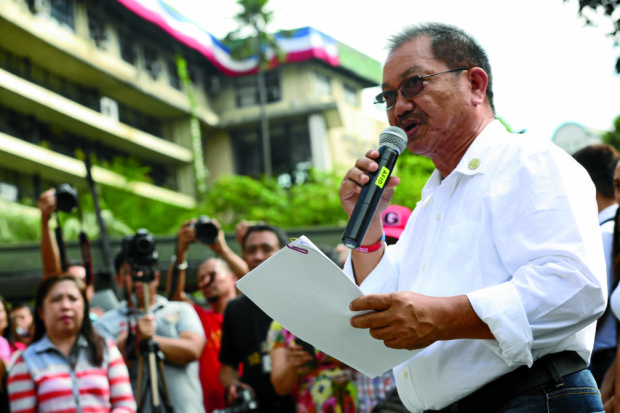Piñol: Greedy rice traders behind inflation warning
Agriculture Secretary Emmanuel Piñol on Sunday saw red and said a mouthful when sought for comment on the opinion of New York-based Global Source that the directive to prioritize buying local rice—and import when there’s a shortfall—may drive prices up if targets are not met.
Saying the deferment of rice importation has actually put an additional P24.38 billion in the pockets of local farmers, Piñol tagged “the greedy businessmen” as the ones behind think-tank warnings of a spike in rice prices.
“I never said that we should not import. All that I asked the President was not to allow importation at peak harvest season,” Piñol said in a text message, when asked by the Inquirer if the rice supply would really be impacted as warned.
“Why don’t you ask the think tank first how he came up with a projection that the rice supply would drop in the coming months?” he said. “The premise made by your think tank—that is, no importation—is totally flawed.”
Piñol stressed that allowing importation would “result in the collapse of the buying price of paddy rice to the disadvantage of the farmers.”
Article continues after this advertisementAsked if better selling prices for local farmers would not raise prices for the consumers on the other end, Piñol said that “the big margin of profit actually goes to the trader.”
Article continues after this advertisement“Even if he buys paddy rice at P20 per kilo and sells the milled rice at P38 per kilo, his gross profit would be no less than P70 million per cropping,” he said.
On Easter Sunday morning, Piñol took to Facebook to rebuke Global Source for its “grim projections,” and wondered aloud: “Who’s behind these so-called Think Tanks?”
The post explained that rice traders took advantage of the glut caused by importation during the peak harvest season to drive down the price of local paddy rice at the farmer’s expense.
“The greedy businessmen are at it again, hiring so-called ‘Think Tanks’ to protect their interests,” read his post, which contained the hashtag #UpYoursThinkTanks! and linked to the Inquirer’s April 16 report on the Global Source commentary.
“Stop scaring us with your ‘projected inflation.’ We know who you are working for,” he said.
He said the think tanks should have considered how President Duterte’s directive “had benefited not only the farmers, but the whole country as well.”
Despite a smaller farming area of 997,687 hectares, Piñol said rice production went up to 4.14 million metric tons, citing data from the Philippine Rice Information System satellite data validated on the ground.
This hinted at better productivity compared to the figures from the first quarter of 2016: 3.93 million metric tons from a bigger area of 1.08 million hectares.
He stressed that good harvest, coupled with the President’s directive, has increased farmers’ income for the period to an estimated P73.08 billion, thanks to higher buying prices.
This estimate he came up with by multiplying the current buying price of P21 per kilogram with the 3.48 million metric tons of rice that farmers could sell (after deducting the 16 percent post-harvest losses from the total production).
Before importation was halted, the buying price used to be P14 or even P12 per kilogram, he said. Going by his math, farmers would have earned only P48.7 billion.
“If the so-called ‘Think Tanks’ consider the figures negligible, I would like to ask them if they figured out how many more farmers’ children will be able to go to school this year,” Piñol wrote.
“I understand street economics. I live in the real world. You don’t,” he said.
Global Source cautioned that a shortfall in rice stock could lead to higher consumer prices and possibly bump up overall inflation past the 2-4 percent target. It was not the first to do so.
On Tuesday the Foundation for Economic Freedom — which promotes free market policies “against populist tendencies and political patronage” and counts prominent economic authorities among its members — called the government’s plan “a dangerous policy that could lead to significant shortages and increased rice prices.”
